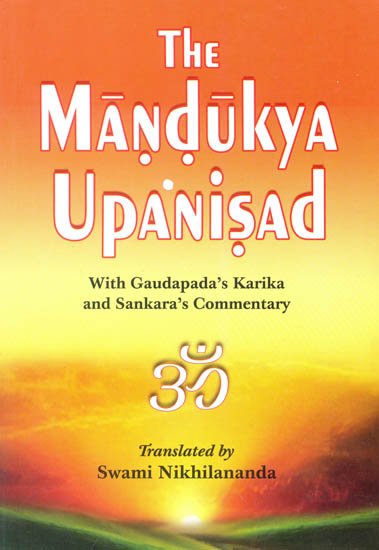Mandukya Upanishad (Gaudapa Karika and Shankara Bhashya)
by Swami Nikhilananda | 1949 | 115,575 words | ISBN-13: 9788175050228
This is verse 3.37 of the Mandukya Karika English translation, including commentaries by Gaudapada (Karika), Shankara (Bhashya) and a glossary by Anandagiri (Tika). Alternate transliteration: Māṇḍūkya-upaniṣad 3.37, Gauḍapāda Kārikā, Śaṅkara Bhāṣya, Ānandagiri Ṭīkā.
Mandukya Karika, verse 3.37
Sanskrit text, IAST transliteration and English translation
सर्वाभिलापविगतः सर्वचिन्तासमुत्थितः ।
सुप्रशान्तः सकृज्ज्योतिः समाधिरचलोऽभयः ॥ ३७ ॥sarvābhilāpavigataḥ sarvacintāsamutthitaḥ |
supraśāntaḥ sakṛjjyotiḥ samādhiracalo'bhayaḥ || 37 ||37. (This Ātman is) beyond all expression by words beyond all acts of mind; (It is) all peace, eternal effulgence free from activity and fear and attainable by concentrated understanding (of the Jīva).
Shankara Bhashya (commentary)
Now is explained the reason for indicating Brahman as without name, etc., as stated above. The word Abhilāpa, meaning expression, denotes here the instrument of sound by which all sounds are expressed. Brahman is beyond speech. The instrument of sound is used in the sense of metonymy, i.e., it also implies other instruments of sense-knowledge. The purport is that the Ātman is beyond all external sense-organs. Similarly, it is beyond all activities of the mind. The word “Chintā” in the text stands for “mind” (or the internal organ of thought). For, the Śruti says, “It is verily without Prana and without mind”, “It is higher than the imperishable Supreme.” It is all peace as it is free from all distinctions. The Ātman is ever-effulgent, that is to say, being of the nature of self-consciousness which is its very essence, it is eternal light. The Ātman is denoted by the word Samādhi 1 as it can be realised only by the knowledge arising out of the deepest concentration (on its essence) or, the Ātman is denoted by Samādhi because the Jīva concentrates his mind on Ātman. It is immovable, i.e., beyond change. Hence, it is fearless as it is free from change.
Anandagiri Tika (glossary)
1 Samādhi—This state of complete identity with non-dual Brahman, arrived at as a result of discrimination and negation of phenomena, is the Vedāntic conception of Samādhi (which is quite different from any mystical or mechanical state described as Samādhi in the Yoga system).
